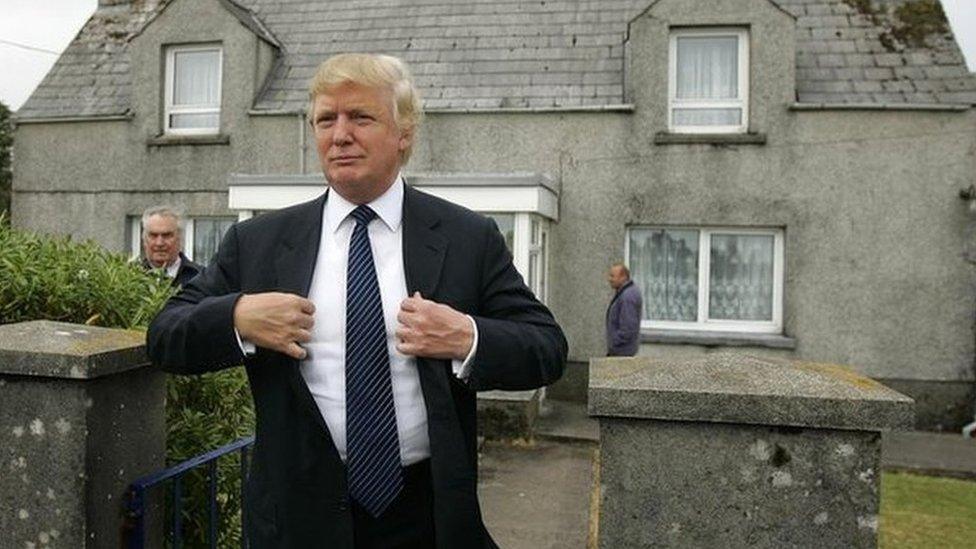US election: The German comparing Trump's campaign to Hitler's
- Published
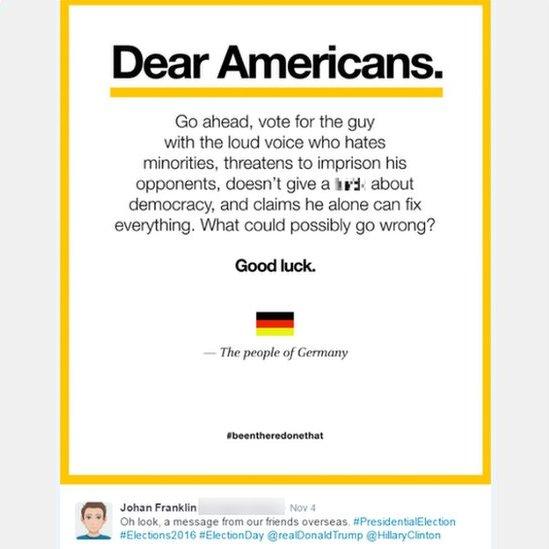
A man who compared the Donald Trump campaign to Adolf Hitler's in the 1930s says he is glad to have started "one of the more civilised discussions" on the US presidential debate.
The tweeter, who says his name is Johan Franklin, posted a note to Americans on Friday from "the people of Germany" asking "what could possibly go wrong?" if they vote for the "guy with the loud voice", who "threatens to imprison his opponents".
The note along with the the hashtag #beentheredonethat, went viral within hours. It prompted memes equating Hitler with Trump but there was also criticism that the comparison was inflammatory.
Mr Franklin, a German citizen who works in San Diego, California, defended his "Dear America" note to the BBC.
"I know the Hitler comparison was pretty crude," he said. "It didn't have much to do with Trump himself, rather that, regardless of what he said and did, he continued to gather people behind him.
"I got frightened when trying to talk to Trump supporters within my circle of friends and colleagues and I started to see parallels to what my grandparents and other folks back home told me about what happened in Germany back in the 1930s."
The post went viral after it was shared by a Hillary Clinton supporter.
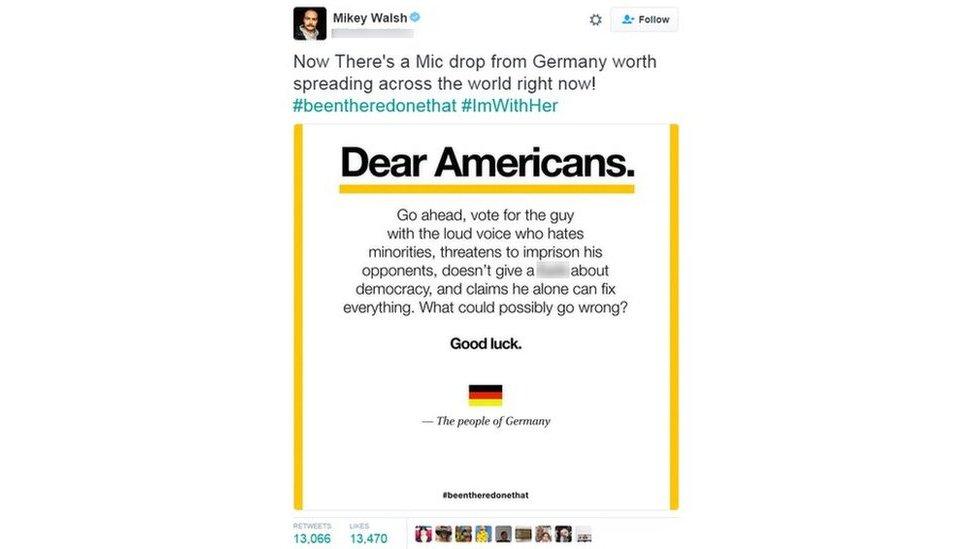
Mr Franklin's "Dear Americans" post was shared thousands of times
After the post was shared, Mr Franklin posted an update, external explaining why he had made the comparison.
In it he said: "Of course I can't speak for the entire population of Germany. I used that signature line as a way of over-dramatising to add emphasis."
And he added: "Yes, it does remind us of something that happened here."
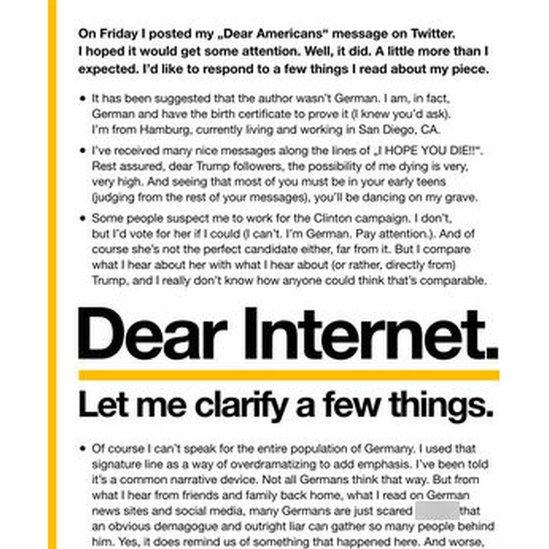
He said: "You cannot compare Trump (or anybody) to the monster that was Hitler.
"But I see a lot of similarities in the way Trump and Hitler gained momentum, amassed followers around them despite so many telltale signs that all is not right.
"Whenever I travelled outside Germany in the past, I've often been asked how the German people could have fallen for Hitler back in the 30s and 40s. 'How could your people not have known?' they asked. I don't get that much question lately."
The message was not one everyone agreed with. Mick Flugennock replied on Twitter: "Yeah, yeah, I know, I know; Trump is Hitler. Cripes, that gag's been beat to death since at least January."
And another response said: "Interesting that you have appointed yourself as the spokesperson of the German people."
Others, including @Caduceus55, pointed out that Germany currently had its own problems to deal with arising from the migrant crisis. He tweeted: "Instead should vote for the woman who admires Merkel and also open borders? How's that working for ya Germany?"
Supporters of Mrs Clinton who shared the message included Dave Telfer, from Dallas, who added a message that read: "Remember this as we head to the polls tomorrow."
Another who shared the post said:, external "Listen to the Germans."
Many Germans were among those who retweeted the message, including Udo Budding,, external in Berlin, who commented on Mr Franklin's post saying: "Couldn't have said it better myself."
Death threats
Mr Franklin, an IT consultant who spends his time working between Hamburg, Germany, and California, United States, said he posted his "Dear Americans" letter because he was concerned about the climate of hate the US presidential election had spawned and the level of debate that had ensued around it on social media.
Discussing the reactive nature of social media, he added: "If there was a 'kill that person instantly' button on Twitter I'm sure people would use it."
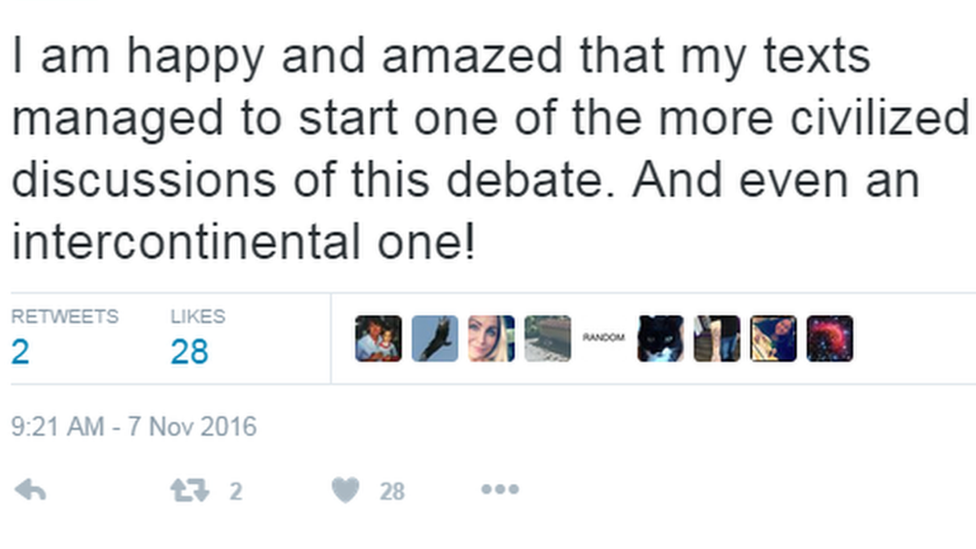
Mr Franklin tweeted to say he was glad to have started a debate
Mr Franklin acknowledged that his letter would have little impact on Trump supporters but was pleased that it had got people talking.
He said there had been some online backlash against his first post - including death threats - but also a positive momentum behind it which meant it had provoked a positive discussion.
Riddled with guilt
"I got messages from people who say they are worried about the same thing but didn't dare speak it out loud," he added.
He said he had not been speaking on behalf of all Germans and was not a supporter of Mrs Clinton. And as a German citizen, he could not even vote in the election.
A father of young children, Mr Franklin said he had grown up with grandparents who shared a "German collective guilt" where they had felt powerless to stop the Nazi movement.
"They were riddled with guilt that they didn't stop Hitler when they still had the chance - though I doubt if they ever had the chance anyway.
"We all grew up with stories like: 'We didn't know! We really didn't! Ok we had a hunch but by then it was too late'."
By Annie Flury, UGC and Social Media Team
- Published7 November 2016
- Published9 November 2016
